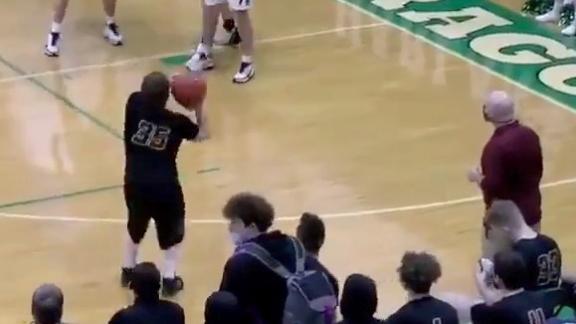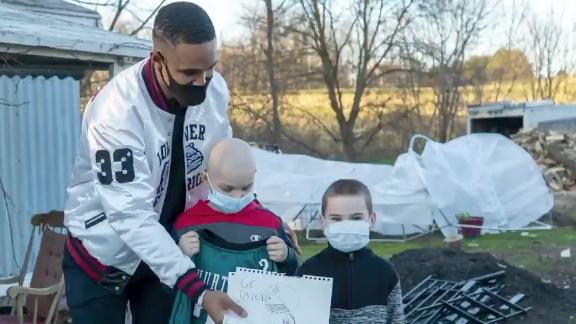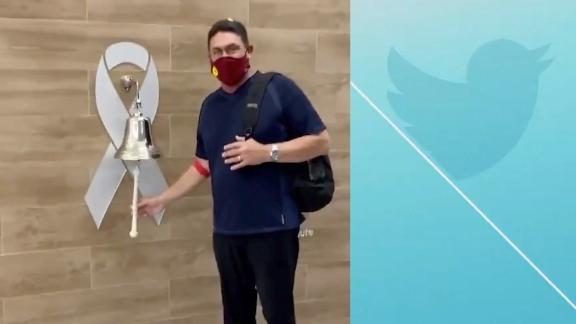If you're an NFL player, it may be the most important piece of paper you can sign before opening day.
Just ask Kenechi Udeze.
In winter 2008, Udeze, a defensive end for the Minnesota Vikings, started feeling intense migraines. He'd had headaches before, but nothing like these. A trip to a Minnesota hospital the day after the New York Giants beat the New England Patriots in Super Bowl XLIII revealed the reason.
Cancer was raging through his blood and bones. Udeze had leukemia.
The deeply religious then-25-year-old was petrified. "It really hit me when I couldn't go home from the hospital," he says. "You want to live life on your own terms. Not get blindsided by something like this."
But he wasted no time starting twice-weekly chemotherapy treatments, followed by a painful bone-graft operation made possible by his brother. Two months later, the cancer was in remission.
That's only where this story starts.
After playing all 16 games of the 2007 season and tying the team lead for sacks, Udeze had hopes for a $10 million-a-year extension with the Vikings in 2008 -- the last year of his contract.
Instead, he was forced to consider himself lucky that the Vikings decided to voluntarily pay his $807,500 salary after putting him on the injured list and giving away his roster spot.
Following a yearlong rehabilitation that sometimes involved four naps a day, Udeze, whose wife had recently given birth to a baby girl, climbed back into pads again in summer 2009.
Everyone in Minnesota wanted to see him make a comeback. He'd turned into a committed advocate for leukemia research and the National Marrow Donor Program, hosting charity soccer games and speaking at grade schools all around the city.
But as the Vikings' 2009 training camp got under way, there was no escaping that, at least on the field, Udeze wasn't his former self. All those cancer-fighting drugs had swelled him, causing his face to spread like putty. Worse, neuropathy, a side effect of the chemotherapy, gave him the kind of numbness in his feet that made it hard for him to plant and get any explosiveness off the line.
In the hardest decision he made, No. 95 announced his retirement from the NFL on July 30, 2009.
Soon after, he filed a claim with the NFL's disability fund asking for help. A few months later, he received word that he'd been denied.
"I was shocked," he says. "I was playing with blood cancer, and they said I didn't have a disability. I had to be fully disabled. But that was never going to happen because of the person I am. I was never going to be a bump on a log. I was always going to fight."
Anyone who knows anything about the disability fund shouldn't be shocked by any of this. Brent Boyd, a former guard for the Vikings who is suing the NFL over its denial of his head-injury claim, formed a group called Dignity After Football because he got so angry at the fund's penny-pinching ways. "It's more about the process than the evidence," Boyd says caustically.
The fund was also grist for a biting 2009 documentary called "Blood Equity." As Mike Ditka says in the film, "It would be different if it was a bunch of guys trying to take advantage of the system. But that's not what this is about. This is about guys who need help."
All of which brings us back to the most important piece of paper Udeze signed as a player.
Just before the 2007 season, his brother, Thomas Barnes, had placed this $2 million disability insurance policy from Lloyd's of London in front of him. At first, Udeze rolled his eyes. His wife was pregnant, and the premium -- $33,000 annually -- struck him as a lot of money.
"I thought, 'Why do I need this? I'm invincible,'" he says.
Says his insurance broker, Matthew Ferraro of International Specialty Insurance in Elkin, N.C.: "You take out insurance on your house. Why not protect your most valuable asset?"
At his brother's urging, Udeze finally cut the check. And in January, after the NFL Disability Fund denied his appeal of its decision, Lloyd's stepped up to pay the policy's entire $2 million benefit.
These days, Udeze's life is as complete as he could want. He just graduated from USC with a sociology degree and is working as a strength coach at the University of Washington with his former USC mentor, Steve Sarkisian. Best of all, he remains cancer-free.
"I don't have any bad days anymore," he says. "I don't even know what a bad day is."
On this Labor Day, his wish for all his former NFL colleagues is that they'll never have to go through what he did, but if they do, that they'll know the same peace.
The Sweet Sawbuck
The best 20 bucks ever spent in the long and artfully shadowy history of boxing has to be the double-sawbuck that Top Rank Promotions laid down so Antonio Margarito could get this license to fight Manny Pacquiao at Cowboys Stadium on Nov. 13.
Bear in mind that no amount of money could persuade California, or any other state, to give Margarito a fight pass after he was caught trying to use a "plasterlike substance" in his hand wraps before a 2009 fight against Shane Mosley.
But everything is bigger in Texas, including, apparently, the ego of William Kuntz, the executive director of the Texas Department of Licensing and Regulation. In 2002, Kuntz denied Mike Tyson a license to fight in Texas while under pressure from Gov. Rick Perry. But this time, he said the decision to grant the license was his ... and his alone!
According to the board's website, Kuntz has been busy sending out news releases about cosmetology licenses and appointing members to the Board of Boiler Rules. Fortunately, things were so light last week that he was able to get Top Rank's license application on Monday and approve it by Thursday.
What the board members who sit on the commission were doing during that time isn't exactly clear. A hearing on the application, Kuntz told reporters, would have been necessary only if he denied the license and Margarito appealed. But none of them seems to be boxing experts, anyway.
Commission chairman Frank Denton is the former head of the Lake Conroe Area Chamber of Commerce. His fellow members list their occupations as counsel for the Alumnae Chapter of the Delta Gamma Sorority; program chairman of the Houston Symphony League; telecom supply company owner from Plano; Midland City Council member; and veep at Texas Woman's University. The only one who lists any sports experience is vice chair Mike Arismendez, who sits on the Texas Association of Sports Officials.
Let's get ready to bumble.
File under ...
U.S. v. Clemens: When federal court officials in Washington, D.C., talk about Roger Clemens' release, they're not waxing nostalgic about his killer fastball. They're referring to this release form, which requires the seven-time Cy Young Award winner to call into the pretrial services office in Washington every two weeks while he defends himself against an indictment charging him with obstructing a congressional inquiry.
Reading list: When Seattle Times reporters Nick Perry and Ken Armstrong deconstruct the University of Washington's 2000 dream season in their new book, "Scoreboard, Baby," you realize that there was nothing dreamy about it. Using documents and jaw-dropping interviews, the reporters build on their groundbreaking newspaper series to create a riveting read.
Digging even further back, author Aaron Skirboll reconstructs the 1985 Pittsburgh drug trials and how MLB ignored a drug scourge that was doomed to repeat itself. The subhead captures the book's spirit: "How A Ragtag Group Of Fans Took The Fall For Major League Baseball."






